


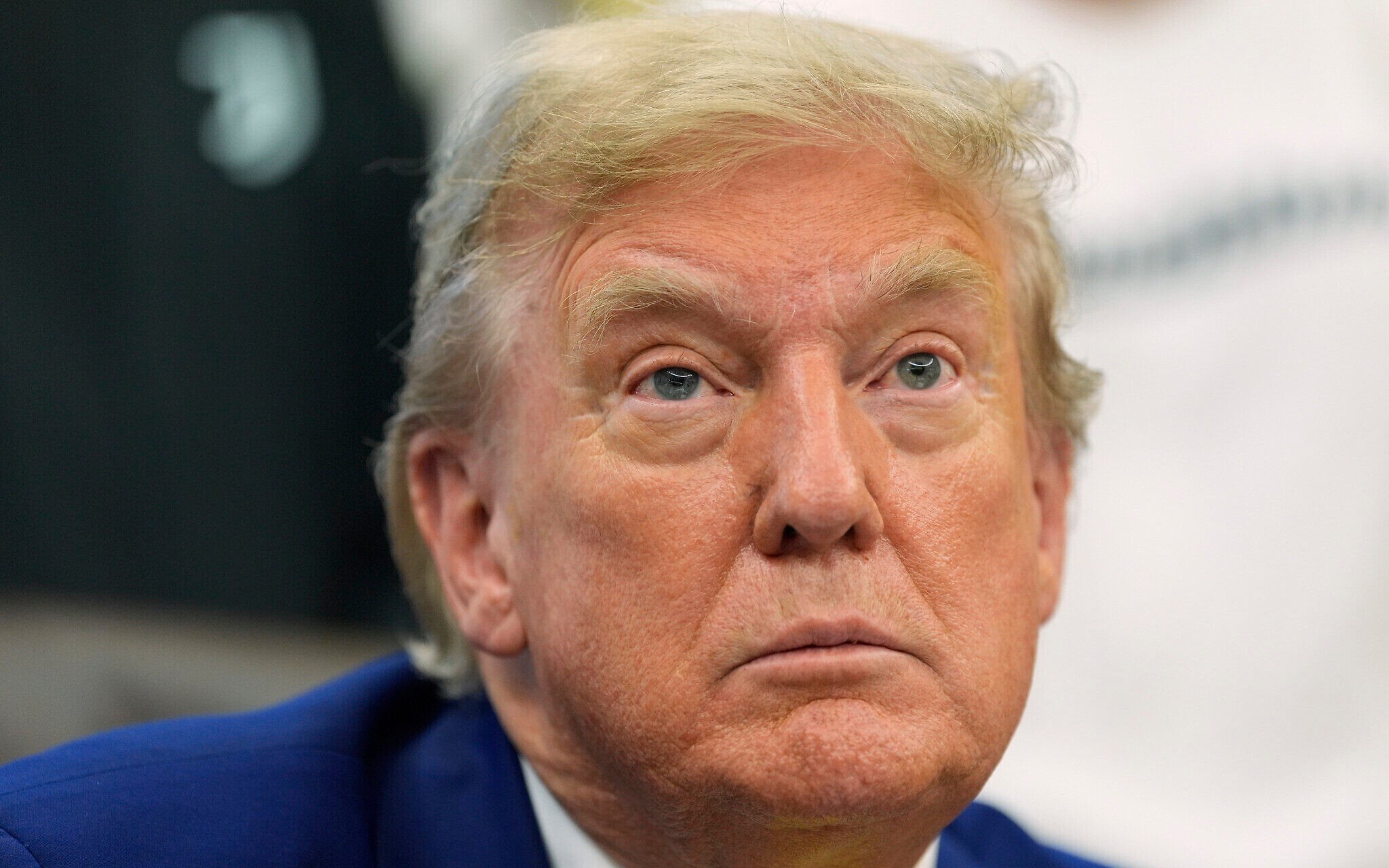
The Times of Israel is liveblogging Thursday’s events as they happen.
China will assist citizens in Israel to evacuate to Egypt from Friday
China’s embassy in Israel will assist Chinese citizens who want to evacuate to leave in batches beginning on Friday, the embassy says in a notice.
The evacuation operation will bring Chinese nationals to the Taba Border Crossing into Egypt via bus, about 360 km (224 miles) from Tel Aviv. The border crossing is near Eilat, on the border with Egypt’s Sinai peninsula.
“The Israel-Iran conflict continues to intensify, with increasing casualties, the possibility of further deterioration cannot be ruled out,” the embassy warns.
IDF says air force downed another Iranian drone
The IDF says the air force downed an Iranian drone, the second in less than an hour.
The drone was intercepted in the area of the Jordan Valley, the IDF says.
The statement comes shortly after the IDF said it had intercepted another drone from Iran in the area of Beit She’an, near the Jordan Valley.
Since the start of the conflict, the IDF says Iran has launched some 1,000 drones at Israel, though fewer than 200 reached Israeli airspace. None have impacted the country, according to the military.
Netanyahu’s Likud party gains strength since start of war — poll
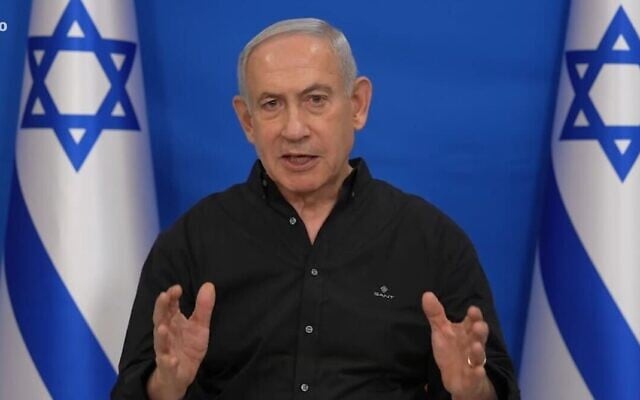
A poll released by the Channel 13 news network, the first since the outbreak of war with Iran, finds Prime Minister Benjamin Netanyahu’s Likud party gaining strength, but the Netanyahu coalition still falling short of a majority in the Knesset.
Respondents are asked which party they would vote for if elections were held today.
Netanyahu’s Likud party climbs from 24 seats to 27 since a poll conducted by the network last week, before the war. Likud regains its place as the largest party.
Former prime minister Naftali Bennett’s newly formed faction, temporarily named Bennett 2026, drops from 27 seats to 24.
National Security Minister Itamar Ben Gvir’s Otzma Yehudit party falls from nine seats to six.
Avigdor Liberman’s Yisrael Beytenu and Yair Golan’s Democrats party each receive 11 seats in today’s poll, while the Haredi Shas party gets 10 seats.
Opposition chief Yair Lapid’s Yesh Atid, Benny Gantz’s National Unity, and the Haredi UTJ each get seven seats.
The Arab-led Hadash-Ta’al faction gets six seats, and the Arab Ra’am party led by Mansour Abbas, four.
Finance Minister Bezalel Smotrich’s Religious Zionism party and the Arab Balad fail to clear the electoral threshold of 3.25%.
Netanyahu’s coalition bloc receives 50 seats, far short of a majority in the 120-seat Knesset. Opposition parties receive 60 seats, and the Arab-led parties have 10. Arab majority parties have traditionally shunned coalitions, though Islamist Ra’am broke that trend when it joined a Bennett-led coalition in 2021-2022.
The survey says that 75% of the public supports the war with Iran, 17% oppose entering the war, and eight percent don’t know.
A majority of respondents — 64% — say they believe Netanyahu launched the war to eliminate Iran’s nuclear program and ballistic missiles, and 28% say Netanyahu was motivated by domestic politics.
The poll has an error margin of 3.9%. The network does not provide a sample size.
US moves military assets in Middle East vulnerable to Iranian attack, officials say
The US military has moved some aircraft and ships from bases in the Middle East that may be vulnerable to any potential Iranian attack, two US officials tell Reuters.
The officials, who were speaking on the condition of anonymity, say the move was part of planning to protect US forces. They decline to say how many aircraft or ships had been moved and where they would be going.
One of the officials says US naval vessels had been moved from a port in Bahrain, where the military’s 5th fleet is located, while aircraft that were not in hardened shelters had been moved from Al Udeid Air Base in Qatar.
“It is not an uncommon practice. Force protection is the priority,” the official says.
Reuters was first to report this week the movement of a large number of tanker aircraft to Europe and other military assets to the Middle East, including the deployment of more fighter jets. An aircraft carrier in the Indo-Pacific is also heading to the Middle East.
It comes as US President Donald Trump keeps the world guessing whether the US will join Israel’s bombardment of Iranian nuclear and missile sites, as residents of Iran’s capital streamed out of the city on the sixth day of the air assault.
Israel downs Iranian drone after sirens sound in northern Israel
The IDF says the air force downed a drone launched from Iran.
Sirens had sounded in the area of Beit She’an in northern Israel due to the drone.
Since the start of the conflict, the IDF says Iran has launched some 1,000 drones at Israel, though fewer than 200 reached Israeli airspace. None have impacted the country, according to the military.
Trump asks advisers if US bombs can destroy Iran’s Fordo nuclear facility — report
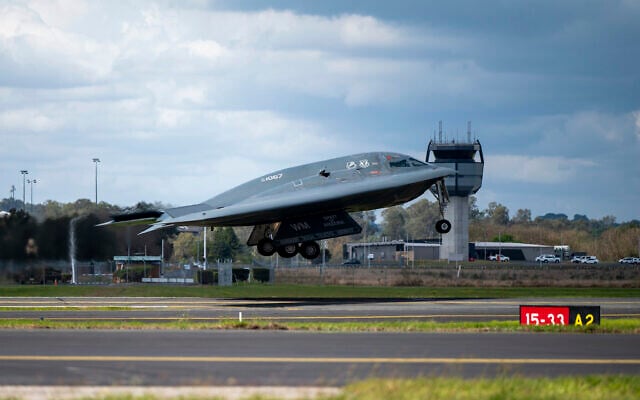
US President Donald Trump has asked his military advisers if 30,000-pound bombs could destroy Iran’s Fordo nuclear facility, Axios reports.
The bunker-buster bombs, known as the Massive Ordnance Penetrators, are in the US arsenal, but Israel does not have the weapons or the bombers needed to deploy the bombs.
Fordo is buried underground at a depth that is believed to be out of reach of Israeli aerial weaponry.
Officials from the Pentagon told Trump they believe the bombs could work against Fordo, although it’s not yet clear if Trump is so sure, Axios reports.
The bombs have never been used in actual combat, only in tests.
European diplomats to hold nuclear talks with Iran on Friday, official says
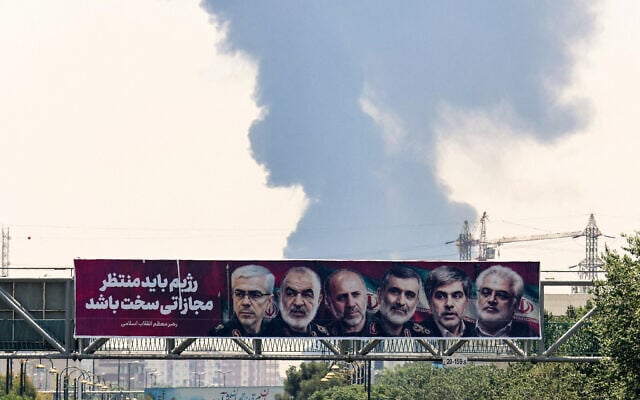
A European official says that senior European diplomats will hold nuclear talks with Iran on Friday.
The high-ranking officials from Germany, France and the United Kingdom as well as the European Union’s top diplomat will gather for the meeting in Switzerland.
The European official spoke on condition of anonymity because they were not authorized to comment publicly.
It comes as Trump is weighing approval for the US military to join Israel in carrying out strikes on Iran’s nuclear program.
A US official says there no plans for US involvement in the nuclear talks, although that could change.
The official, who spoke on condition of anonymity to discuss private diplomatic communications, also notes that the Europeans have been wanting to play a role in the negotiations for months but have been held back by the US.
That position, the official says, may be changing as the hostilities intensify.
Also, a British official with knowledge of the situation in the Middle East says there “isn’t complete clarity” about the American plan in the region.
The official says they understand the US is still debating what to do but believe that “all options” are on the table.
The official, who spoke on condition of anonymity to speak freely on the matter, says Trump wants to put pressure on Iran to do a deal and suggested he does not want to go to war.
The British official says the US is mounting a “very strong defensive response,” which allows a lot of choice “whichever way this goes,” but emphasizes that the US is framing the current operation as “primarily defensive.” That includes protecting US bases and personnel in the Middle East.
Putin says Russia could help broker a deal between Israel and Iran
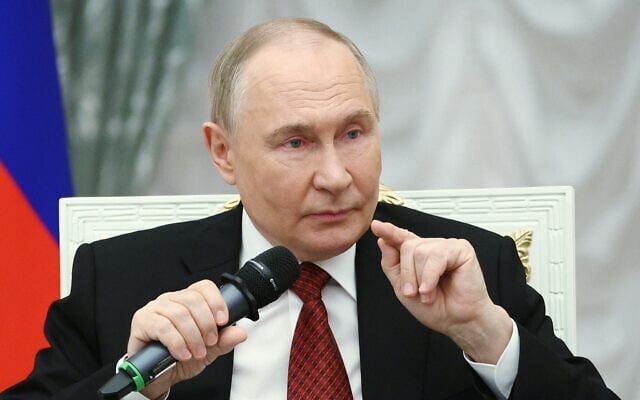
Russian President Vladimir Putin offers to help mediate an end to the conflict between Israel and Iran, suggesting Moscow could help negotiate a settlement that could allow Tehran to pursue a peaceful atomic program while assuaging Israeli security concerns.
Speaking to senior news leaders of international news agencies, Putin notes that “it’s a delicate issue,” but adds that “in my view, a solution could be found.”
Asked how Russia would react if Israel kills Iran’s Supreme Leader Ayatollah Ali Khamenei, Putin refuses to answer, saying that “I don’t even want to discuss such a possibility.”
Putin says he shared Moscow’s proposals with Iran, Israel and the US.
“We are not imposing anything on anyone; we are simply talking about how we see a possible way out of the situation. But the decision, of course, is up to the political leadership of all these countries, primarily Iran and Israel,” he says.
Putin notes that Russia helped Iran finish construction of a nuclear power plant and is currently working on building two more reactors.
“The work is underway, and our specialists are on site. That’s over 200 people. And we agreed with the Israeli leadership that security will be ensured,” Putin says.
Putin’s comments follow a mediation offer that he made in a call with U.S. President Donald Trump last weekend.
Trump says that he told Putin to keep focused on finding an endgame to his own conflict with Ukraine.
“I said, ‘Do me a favor, mediate your own,’” Trump says he told Putin. “I said, ‘Vladimir, let’s mediate Russia first. You can worry about this later.’”
The comments represented a shift for Trump, who earlier this week said he was “open” to Putin’s offer to mediate in the Middle East.
Russia has maintained a delicate balancing act in the Middle East for decades, trying to navigate its warm relations with Israel even as it has developed strong economic and military ties with Iran, a policy that potentially opens opportunities for Moscow to play power broker to help end the confrontation.
Columbia U antisemitism report finds widespread disaffection among Jewish students
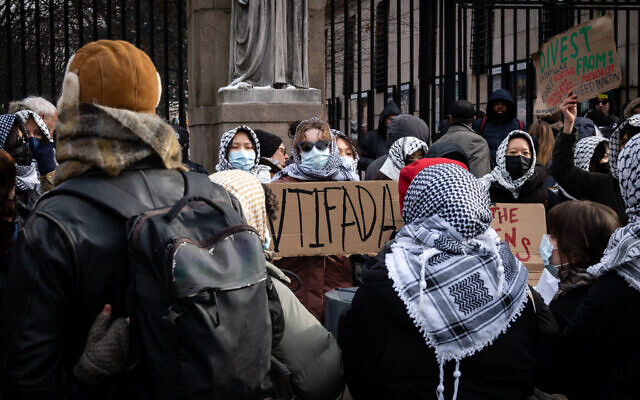
Columbia University’s Task Force on Antisemitism releases a report, finding that Jewish students have experienced widespread disaffection on campus since the October 2023 terror attack on Israel and ensuing turmoil on the Ivy League campus.
“I found the results of this survey difficult to read. They put the challenges we face in stark relief,” acting university president Claire Shipman says in a statement. “Antisemitism can and should be addressed as a unique form of hatred.”
“I am confident we can change this painful dynamic,” she adds.
A survey of thousands of students found that 50% reported positive feelings of belonging, but only 34% of Jewish students felt they belonged, and 41% of Muslim students.
A majority of Jewish students also said they did not feel accepted for their religious identities, felt concerned about expressing their beliefs, and said that expressing support for any side in the Israeli-Palestinian conflict made them feel unsafe, the report says.
The task force has released two previous reports that produced similar findings.
Iran executed at least 975 people last year, highest total since 2015, UN says
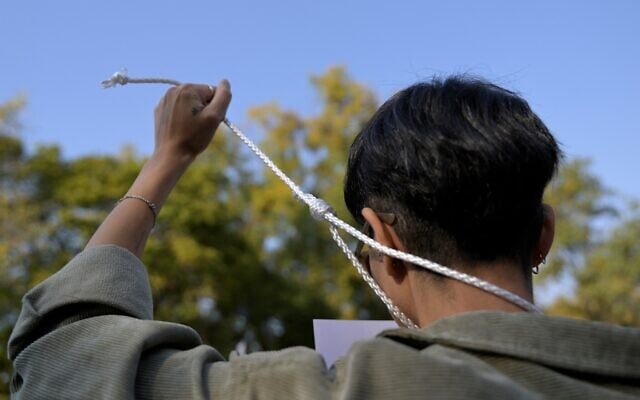
Iran carried out executions at “an alarming rate” last year with at least 975 people killed, the United Nations chief says in a report that also cites other human rights abuses, from barriers to freedom of expression to the use of torture and arbitrary detention.
UN deputy human rights commissioner Nada Al-Nashif, who presented the report to the Geneva-based Human Rights Council on Wednesday, urges Iran to halt all executions as a first step toward a ban.
She also calls for urgent diplomatic negotiations to end the escalating conflict between Iran and Israel.
The 975 people executed in 2024 surpassed the estimated 834 in 2023 and was the highest rate of executions since 2015, says the report by Secretary-General Antonio Guterres. Four of the executions were carried out publicly. Iran carries out executions by hanging.
Of those executed, 52% were for drug-related offenses, 43% for murder, 2% for sexual offenses and 3% for security-related offenses, the report says.
The number of women executed also increased. According to information received by the UN human rights office, at least 31 women were reported to have been executed in 2024, up from at least 22 in 2023. Among those 31 women were 19 reportedly executed for murder, including nine convicted of killing their husbands in cases involving domestic violence, forced marriage or child marriage.
Also among those executed were women and men connected to protests that began in September 2022 following the death of Mahsa Amini, 22, who was arrested by Iran’s morality police and accused of not wearing her head covering correctly.
The report also says a disproportionate number of those executed were from Iran’s minorities, with at least 108 Baluch prisoners and 84 Kurdish prisoners among those executed last year.
Citing information received by the human rights office, the report says at least 31 people, including political dissidents, were executed for national security-related offenses such as spying for Israel.
The rights office says it also received reports of torture, arbitrary detention and trials that failed to comply with due process and fair trial standards.
As for the rights to freedom of expression, association and peaceful assembly, the report says information received by the rights office found that at least 125 journalists were prosecuted for their work in 2024. At least 40 female journalists were prosecuted or summoned for their reporting, the report says.
Al-Nashif says Iran has cooperated with the human rights office, but Guterres regrets that the government has denied access to the independent international fact-finding mission on Iran that the Human Rights Council established.
